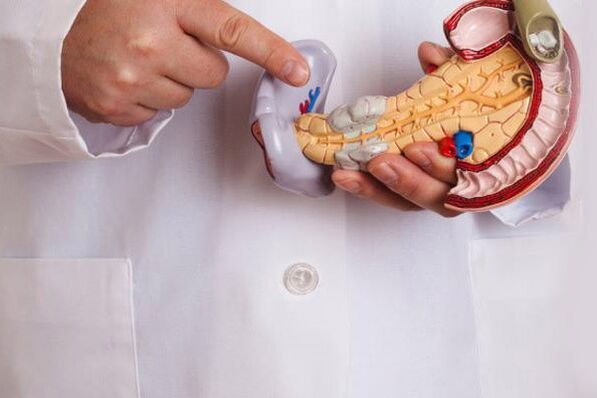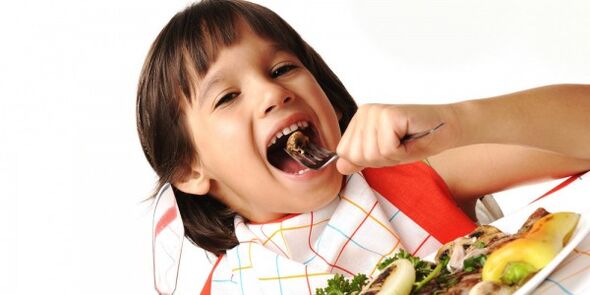Diet for pancreatitis is a key factor in successful treatment, so adhering to dietary restrictions makes it possible to lead a full life and reduce the likelihood of relapse.
Pancreatitis is an inflammation of the tissue of the pancreas, accompanied by impaired secretion of digestive enzymes, severe pain, stool changes, and vomiting. This leads to abnormal metabolic disorders and can lead to the development of diabetes. The main causes of pancreatitis are: overeating, abuse of fatty foods and alcohol.
Adherence to a diet during pancreatitis is essential for a long time. Acute inflammation requires restriction of diet for 6-9 months, while in chronic pancreatitis diet is followed for several years or indefinitely.
Power characteristics

Approaches to dieting for pancreatitis depend on whether the inflammation is acute or chronic. Doctors note the positive effects of diet on pancreatitis. It allows you to quickly overcome acute inflammation, avoid complications and extend the period of remission in the chronic process.
Diet Features:
- For 2-3 days after an acute attack of pancreatitis you should completely reject food. Thus, rest is provided for the pancreas. Therapeutic fasting involves the use of fluids in the form of non-carbonated alkaline mineral waters, weakly brewed tea or rose infusion, per cup 5-6 times a day.
- On the fourth day after the start of therapeutic fasting, the gradual introduction of solid foods into the diet begins. Typically, these are unsalted low-calorie dishes that gradually increase the secretion of gastric juice.
- In pancreatitis, the way you prepare food is important. It is recommended to cook on steam, because food prepared in this way retains all the necessary substances and does not damage the digestive tract.
- Food should not be chilled or hot, the optimum temperature is close to body temperature. In this case the food should be grated or semi-liquid.
- Diet for pancreatitis limits the consumption of dietary foods. They eat small portions at least five times a day.
Diet excludes food:

- Fatty;
- fried;
- Hot sauces and spices;
- Acidic juices;
- Canned food, pickles;
- Smoked meat;
- Confectionery;
- Cocoa, chocolate;
- Alcohol.
The energy value of such food should be at the level of 2500 kcal.
The disadvantage of such a diet is the acute shortage of raw plant foods. Compensation for some components is required by taking complex vitamins and nutritional supplements.
Diet for acute pancreatitis
In the treatment of pancreatitis, diet is an integral part of therapy. The attack during exacerbation is accompanied by severe pain in the stomach and lack of appetite, so the first days of medical fasting do not cause the patient suffering.
In addition, dietary low-calorie foods are gradually being included in the diet. It can be dried raw bread, berry fruit drinks and jellies, oatmeal and rice viscous decoction, liquid ground potatoes without oil. At this time it is recommended to exclude products that contribute to the production of gas.
On the 6th-7th day, protein dishes are gradually introduced: steamed meat, mashed potatoes or vegetable puddings, steamed protein omelette.
It should be noted that diet requires long-term adherence to dietary restrictions. For 6-9 months you need to strictly follow its rules and control your diet daily.
The course of the disease may have certain characteristics, so a diet is prescribed by a gastroenterologist and a dietitian. Specialists in this profile will determine what you can eat on a diet for each individual patient during pancreatitis, taking into account the comorbidities.
After the disappearance of the acute period of the disease, you can significantly diversify your menu with simple and healthy products. It should be noted that the amount of food should be at least four, and the volume of fluid per day is about 1. 5 liters.
Sample menu:
- Breakfast: semolina (rice) porridge cooked in water; Apple; Weakly brewed green tea with one teaspoon of honey.
- Second breakfast: steamed chicken breast cutlet; Carrot puree; Decoction of rose berries.
- Lunch: vegetable broth with beef or fish; Potato Puree; White bread croutons; Baked apples without skin.
- Afternoon breakfast: low-fat cottage cheese; Teaspoon of green tea with honey.
- Lunch >: Steamed egg protein omelet from three chicken eggs; Mashed potatoes from diet vegetables; White bread croutons.
- Before bedtime: cottage cheese milk.
The symptoms and treatment of pancreatitis during diet are significantly relieved. Such a meal saves the pancreas and gradually normalizes its work. The well-being of the patient will depend on how strictly he adheres to the diet. Any disturbance of the food ration immediately affects the digestive function.
Diet for chronic pancreatitis
Chronic pancreatitis most often develops against the background of an acute condition, but it can appear as a primary disease in cases where it is a complication of other diseases.
Diet and treatment of pancreatitis are two inseparable concepts. Dietary guidelines should be followed even during remission.
Diet rules for chronic pancreatitis:
- The caloric content of food during this period should be commensurate with daily physical activity.
- Much attention is paid to the protein content in food. Turkey, chicken, rabbit, beef, lean pork and fish are allowed.
- It is not allowed to include lamb, fatty pork, goose, duck and game in the ration.
- Thermal processing of food does not allow burning, baking in the oven, stewing. Food should be cooked in a double boiler or cooked.
- Cheese that was previously banned at the aggravation stage is now allowed in small quantities, but it is desirable to replace milk with fermented dairy products.
- The diet should include vegetable proteins, which are represented by cereals and yesterday's bread, however, it should be borne in mind that legumes should be completely excluded during the diet with pancreatitis.
- The total amount of carbohydrates should not exceed 350 g per day. They are found in pasta, cereals, honey, canned foods and syrups.
Approximate diet menu for chronic pancreatitis:
- Breakfast: boiled rabbit meat; Rice porridge.
- Late breakfast: low-fat cottage cheese; Baked apples without honey.
- Lunch: buckwheat soup; Boiled or steamed fish with vegetables; Dried fruit compote.
- Afternoon Breakfast: Steamed cutlets with vegetable sauce.
- Dinner: veal, sugar-free cottage cheese pudding; Weak tea.
- Before bedtime: Kefir.
The meal is fragrant and in small portions. Food should be eaten warm, at intervals of about three hours.
Salt and spices increase the secretion of enzymes in the digestive tract, so their amount should be kept to a minimum. In addition, sour cream, smoked foods, baked goods and sour cream, as well as chocolate have similar effects. Sugary foods can lead to complications such as diabetes, so their content in the diet is reduced by 90%.














































































